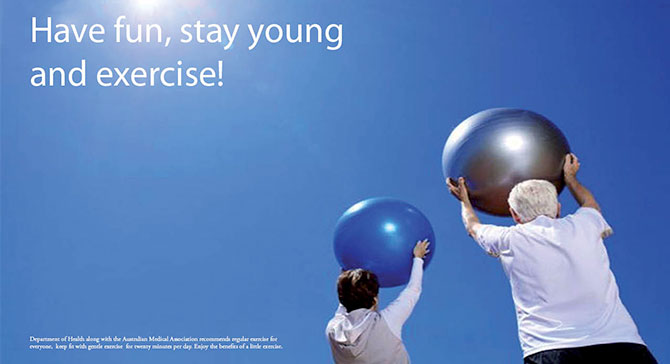
When we cry out “Happy New Year!” we mean it! Everyone wants to be happy in the new year. As we grow older, we need to understand that happiness stems less from material possessions and more from health, good relationships, and fulfilling activities which keep us engaged in life. In fact, according to many polls, losing their health is the greatest worry of seniors.
You can take action to have both health and happiness in the New Year. Get active. At Parkwood Heights Senior Campus, we offer more than just physical activities, but intellectual and social activities too. You’ll feel better, improve your health, attitude, and keep your brain working.
Plan to be Active in 2012
Get out the calendar and schedule 15 minutes each day for the next four days; use this time to plan how you’ll get started. Plan on trying these activities gradually over the next months. Get a friend at Parkwood Heights to join in and keep you motivated. Work on all of the 10 ways to get active; each will bring you a year’s worth of rewards.
- Invest in a good pair of shoes. When your feet are happy, so are you. Foot pain is not a normal part of the aging process. If you have pain in your feet, see a podiatrist (foot doctor). Comfortable, well-fitting shoes and socks are a must and, worth the investment.
- Play games. Games keep your brain working and cognitive skills healthy; plus, it’s a fun way to spend time with others. Trivia, math, memory, there is a game for all personalities. You can be competitive or challenge yourself. There are many free games on the internet; Ask the Parkwood Heights staff to help you find them.
- Take a walk. Walk around the Parkwood Heights campus or building, walking a mile is rewarding exercise. Walking improves lower body strength, maintains mobility, and helps prevent cognitive decline. Research studies have shown that two short walks a day can be as good as a single, longer stroll.
- Stand on one leg. Actually, you will work up to standing on one leg by performing balance exercises. Good balance helps you with everyday activities and avoiding falls. When you have confidence in your balance skills, you also have confidence to walk outside on the Parkwwod Heights Campus. The exercise classes we offer are designed for the older adult and also incorporate balance training.
- Visit an eye doctor. Failing eyesight is not a given as we age. One recent study reported that much of the vision impairment in a large group of people over 60 years old could be improved with corrective lenses. An optometrist can prescribe the best plan for your eyes.
- Increase your physical activity. Take advantage of the opportunities for physical activity offered at Parkwood Heights, a weekly walking date with a neighbor, Wii Bowling, playing Pool, Indoor Horseshoe’s, Darts, Shuffleboard. These activities are offered along with the regular Exercise Classes.
- Seek out your friends, family and neighbors. Social connections are good for your emotional well-being. Studies have shown that friendships and a vibrant social support network not only prevent loneliness, but also provide a ready source of intellectual, physical and volunteer activities. Data even suggests that people with a strong social network lower their risk of Alzheimer’s disease.
- Eat fruits and vegetables. Switch to a diet that emphasizes fruits, vegetables, legumes, cereals, some fish, and limiting dairy and meat. This will help you lower your body weight and cholesterol levels. People who eat a balanced, plant-based, diet don’t worry much about counting calories, and gain many vitamins and minerals. You can find fruits and vegetables fresh, frozen, canned, dried, and juiced.
- Laugh a lot. Laughing increases circulation, immune system defenses and mental functioning while decreasing stress hormones. Watch comedies, read a humor book along with the comics. Read the Parkwood Heights Blog published on December 27, 2011
- Get enough sleep. Get your seven to eight hours of sleep each night. Insomnia affects almost half of adults 60 years and older, making it the most common sleep complaint. If you have trouble falling or staying asleep, make a few changes in your habits, such as skipping daytime naps, adopting a nighttime routine, and starting a regular exercise program. Changing your habits is more successful at improving sleep than taking medications.
Did you notice that virtually every activity improves your mental health and reduces the risk of dementia? By increasing your levels of physical activity, social interaction and intellectual engagement, your New Year plan of activities will increase your health and happiness.
